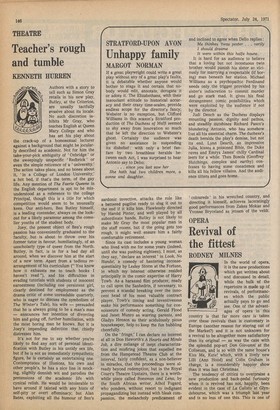STRATFORD-UPON AVON
Unhappy family
MARGOT NORMAN
If a great playwright could write a great play without any of a great play's faults, it is debatable whether anyone would bother to stage it and certain that nobody would edit, annotate, derogate it or adore it. The Elizabethans, with their insouciant attitude to historical accuracy and their crazy time-scales, provide endless scope for the director's fancy; Webster is no exception, but Clifford Williams in this season's Stratford production of The Duchess of Malfi seemed to shy away from innovation so much that he left the direction to Webster's ghost. Certainly the nidience was given no assistance in suspending its disbelief : with only a brief fanfare by two breathless heralds between each Act, I was surprised to hear Antonio say to Delio: . . . since you last saw her She hath had two children more, a sonne and daughter. and inclined to agree when Delio replies : Me thinhes 'twas yester . . . verity I should dreame It were within this halfe houre.
It is hard for an audience to believe that a loving but not incestuous twin brother would punish his sister so viciously for marrying a respectable (if boring) man beneath her station. Michael Williams as a psychopathic Ferdinand needs only the trigger provided by his sister's indiscretion to commit murder and go stark mad. It gives his final derangement comic possibilities which were exploited by the 'audience if not by the director.
Judi Dench as the Duchess displays mounting passion, dignity and pathos, and steadily outshines Richard Pasco's blundering Antonio, 'who has somehow lost all his essential charm. The duchess's death heralds the play's demise, but not its end. Lynn Dearth, an impressive Julia, kisses a poisoned Bible, the Duke raves and Emrys James' chilly Cardinal leers for a while. Then Bosola (GeOffrey Hutchings, complex and earthy) confesses to having some conscience and kills all his fellow villains. And the audience titters and goes home.










































 Previous page
Previous page